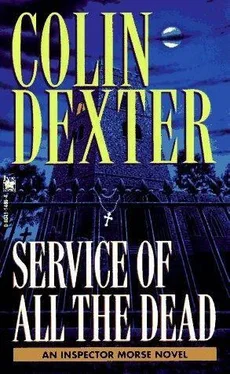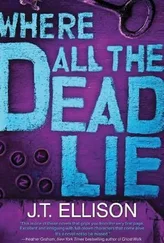Colin Dexter - Service of all the dead
Здесь есть возможность читать онлайн «Colin Dexter - Service of all the dead» весь текст электронной книги совершенно бесплатно (целиком полную версию без сокращений). В некоторых случаях можно слушать аудио, скачать через торрент в формате fb2 и присутствует краткое содержание. Жанр: Триллер, на английском языке. Описание произведения, (предисловие) а так же отзывы посетителей доступны на портале библиотеки ЛибКат.
- Название:Service of all the dead
- Автор:
- Жанр:
- Год:неизвестен
- ISBN:нет данных
- Рейтинг книги:3 / 5. Голосов: 1
-
Избранное:Добавить в избранное
- Отзывы:
-
Ваша оценка:
- 60
- 1
- 2
- 3
- 4
- 5
Service of all the dead: краткое содержание, описание и аннотация
Предлагаем к чтению аннотацию, описание, краткое содержание или предисловие (зависит от того, что написал сам автор книги «Service of all the dead»). Если вы не нашли необходимую информацию о книге — напишите в комментариях, мы постараемся отыскать её.
Service of all the dead — читать онлайн бесплатно полную книгу (весь текст) целиком
Ниже представлен текст книги, разбитый по страницам. Система сохранения места последней прочитанной страницы, позволяет с удобством читать онлайн бесплатно книгу «Service of all the dead», без необходимости каждый раз заново искать на чём Вы остановились. Поставьте закладку, и сможете в любой момент перейти на страницу, на которой закончили чтение.
Интервал:
Закладка:
Morse: I think the idea must have been for Josephs to stay where he was until the dust had settled and then to get right away from Oxford somewhere. But that again has to be guesswork. What is certain is that he very soon learned that the Reverend Lionel Lawson had committed suicide and-
Marshall: I'm sorry to interrupt you again, but is it your view that in that death, at least, the late Mr Josephs could have had no hand whatsoever?
Morse: It is, sir. News of Lawson's death, as I say, would have been a big shock to Josephs. He must have wondered what on earth had gone wrong. Specifically he must have wondered many times whether Lawson had left a note and, if so, whether the note in any way incriminated himself and the others. Quite apart from that, though, Josephs had been dependent on Lawson. It was Lawson who had arranged his present hide-out and it was Lawson who was arranging his impending departure from Oxford. But now he was on his own, and he must have felt increasingly isolated. But again that's guesswork. What is clear is that he started going out into Oxford during the early winter months. He wore Philip Lawson's old clothes, with the long dirty greatcoat buttoned up to the neck; he wore a pair of dark glasses; he grew a beard; and he found that he could merge quite anonymously into the Oxford background. It was about this time, too, I think, that he must have realised that there was now only one other person who knew exactly what had taken place in the vestry that September evening; and that person was Paul Morris, a man who had robbed him of his wife, a man who was probably going to live with her after the end of the school term, and a man who had done very nicely out of the whole thing, without actually doing very much at all himself. It is my own view, by the way, sir, that Paul Morris may not have been quite so eager to get away with Mrs Josephs as he had been. But Josephs himself could have no inkling of that, and his hatred of Morris grew, as did his sense of power and his rediscovered capacity for the sort of action he had once known as a captain in the Royal Marine Commandos. On some pretext or other Josephs was able to arrange a meeting with Paul Morris at St Frideswide's, where he killed him and hid his body -though probably not, at that point, on the roof of the tower. Remember that no keys had been found in the clothing of the man murdered in the vestry; and it is clear that Josephs kept them for himself, and was therefore able to use the church for the murders of Paul Morris and his son Peter. Not only that, though. He was compelled to use the church. He was disqualified from driving, and without a licence, of course, he couldn't even hire a car. If he'd had a car, he would probably have tried to dispose of the bodies elsewhere; but in this respect, at least, he was a victim of circumstance. Later the same day – at tea-time in fact – he also arranged to meet Peter Morris, and there can be little doubt that the young boy was also murdered in St Frideswide's. I'm pretty sure his first idea was to hide both bodies in the crypt, and as soon as it was dark he put the boy in a sack and opened the door at the south porch. Everything must have seemed safe enough and he got to the grilled entrance to the crypt in the south churchyard all right – it's only about fifteen yards or so from the door. But then something happened. As he was carrying the body down, the ladder snapped and Josephs must have had an awkward fall. He decided that he couldn't or daren't repeat the process with a much bigger and heavier body; so he changed his plans and carried Paul Morris' body up to the tower roof.
Marshall: And then he decided to murder his wife?
Morse: Yes, sir. Whether at this point he knew exactly where she was; whether he had actually been in touch with her; whether he was able to find out anything from Paul Morris – I just don't know. But once the bodies – or just one of them – were found, he was going to make absolutely sure that she didn't talk, either; and, in any case, with Paul Morris now out of the way, his jealous hatred was directing itself ever more insanely against his wife. For the moment, however, he had a dangerous job on his hands. He had to get to the Morrises' house in Kidlington and try to make everything there look as if they'd both left in a reasonably normal manner. It was no problem getting into the house. No keys were found on either of the Morrises, although each of them must have had a latchkey. Once inside-
Marshall: Yes, yes. Thank you, Inspector. Could you now tell the Court exactly where the defendant fits into your scheme of things?
Morse: I felt reasonably certain, sir, that Miss Rawlinson would be safe only so long as she herself had no knowledge of the identities of the bodies found in St Frideswide's.
Marshall: But as soon as she did – tell me if I am wrong, Inspector – Josephs decided that he would also murder the defendant?
Morse: That is so, sir. As you know, I was an eye-witness to the attempted murder of Miss Rawlinson, and it was only at that point that I was convinced of the true identity of the murderer – when I recognised the tie he tried to strangle her with: the tie of the Royal Marine Commandos.
Marshall: Yes, very interesting, Inspector. But surely the defendant was always just as much of a threat to the murderer as Brenda Josephs was? Don't you think so? And, if she was, why do you think he treated the two women so differently?
Morse: I believe that Josephs had grown to hate his wife, sir. I made the point earlier in my evidence.
Marshall: But he didn't feel the same hatred towards the defendant – is that it?
Morse: I don't know, sir.
Marshall: You still wish to maintain that there was no special relationship between the defendant and Mr Josephs?
Morse: I have nothing to add to my earlier answer, sir.
Marshall: Very well. Go on, Inspector.
Morse: As I say, sir, I felt convinced that Josephs would attempt to kill Miss Rawlinson almost immediately, since it must have been clear to him that things were beginning to move very fast indeed, and since Miss Rawlinson was the only person left, apart from himself, who knew something of the truth – far too much of it, he must have felt. So my colleague, Sergeant Lewis, and myself decided we would try to bring the murderer out into the open. We allowed a slightly inaccurate report on the case to appear prominently in the Oxford Mail with the sole purpose of making him suspect that the net was already beginning to close on him. I thought that wherever he was – and remember that I had no idea whatsoever that he was living in the same house as Miss Rawlinson – he was almost certain to use the church once more. He would know exactly the times when Miss Rawlinson would be cleaning there, and he had his plans all ready. In fact, he got to church very early that morning, and managed to ruin the precautions which we had so carefully taken.
Marshall: But fortunately things worked out all right, Inspector.
Morse: I suppose you could say that. Thanks to Sergeant Lewis.
Marshall: I have no more questions.
Johns: I understand, Inspector, that you heard the conversation between my client and Mr Josephs before the attempt to strangle her was made.
Morse: I did.
Johns: In that conversation, did you hear anything which might be considered by the Court to be mitigating evidence in the case against my client?
Morse: Yes. I heard Miss Rawlinson say that she-
Judge: Will the witness please speak up for the Court?
Morse: I heard Miss Rawlinson say that she had decided to go to the police and make a full statement of all she knew.
Читать дальшеИнтервал:
Закладка:
Похожие книги на «Service of all the dead»
Представляем Вашему вниманию похожие книги на «Service of all the dead» списком для выбора. Мы отобрали схожую по названию и смыслу литературу в надежде предоставить читателям больше вариантов отыскать новые, интересные, ещё непрочитанные произведения.
Обсуждение, отзывы о книге «Service of all the dead» и просто собственные мнения читателей. Оставьте ваши комментарии, напишите, что Вы думаете о произведении, его смысле или главных героях. Укажите что конкретно понравилось, а что нет, и почему Вы так считаете.












